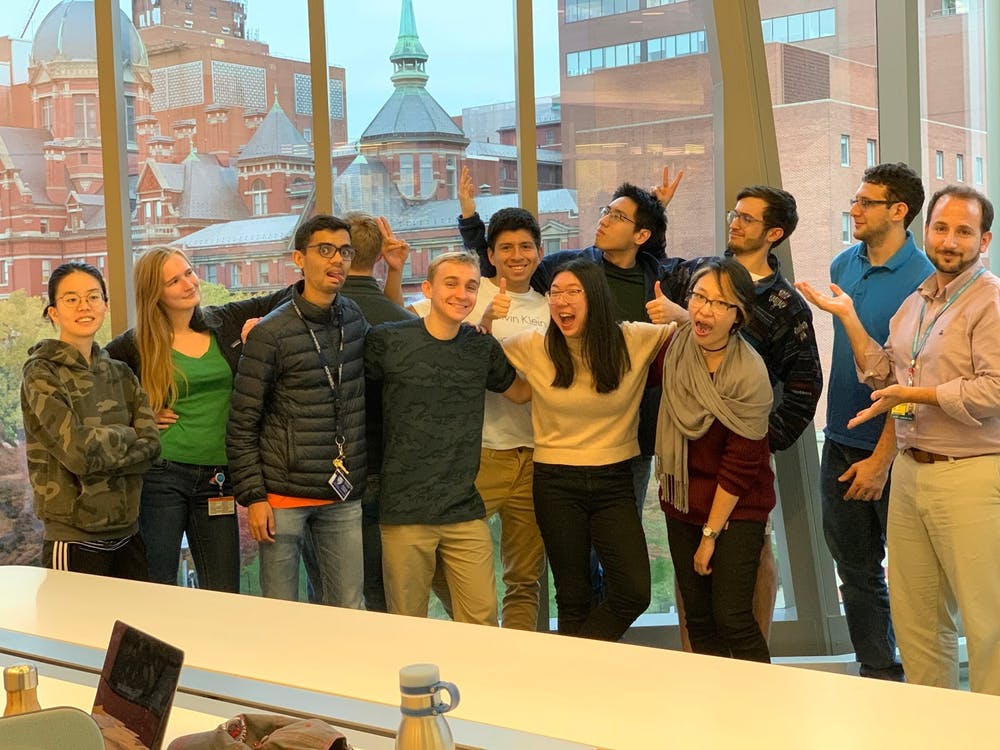As a newly appointed Assistant Professor of Biomedical Engineering and Materials Science at the School of Medicine, Joshua Doloff is not only a research scientist advancing the fields of immunoengineering and regenerative medicine, but also a mentor to students.
A combination of previous research experiences, impactful mentors and following what makes him happy has led him to Hopkins, where he recently started the Doloff Lab.
In an interview with The News-Letter, Doloff explained that the lab is currently researching how the human immune system perceives and responds to deliverables when they are introduced to the body.
“When you put something in the body, whether that is a nanoparticulate, a macroscopic object, like a bulky biomedical device or even just pharmacologic agents, how do the body, tissue and cells — whether immune, epithelial or otherwise — that are in that environment, receive the therapeutic, and how do they respond to it?” Doloff said.
His curiosity in the concept of nature versus nurture was spawned by a personal characteristic: he has a twin brother. As an undergraduate student, this interest led him to join his first lab in the field of developmental genetics. Over his two years in the lab, he learned valuable techniques such as DNA isolation, polymerase chain reaction and gene mapping.
Later in his undergraduate career, an impactful materials science lecture inspired him to pursue biomaterials research. He focused on bone repair regeneration in a lab aligned with his Bioengineering major at the University of Pennsylvania.
He went on to complete his degree but ran out of time to translate his research findings to animal models.
“There was this big empty space, this big question at the time,” Doloff said.
The fields of biomimetics and biocompatibility were beginning to grow rapidly, and he wanted to continue his research of complex host responses to foreign objects.
Upon entering his PhD program at Boston University, he studied how therapeutic administration affected immune responses.
His initial work covered genetic engineering cloning in synthetic biology, where he contributed to the making of novel selective viral vectors for gene therapy.
In other words, Doloff focused on ensuring that viruses would only affect cancer tissue, sparing normal cells. He described how he made a breakthrough in cancer immunology.
“By changing the dose and administrative schedule, you actually give [a chemotherapeutic agent] a secondary function,” he said.
“Don’t even change anything about the body, nothing about the drug itself, just give it in a slightly different way. It opened up the whole world to me about pharmacokinetics.”
Following his PhD, Doloff continued as a postdoctoral fellow in the labs of Robert Langer and Daniel Anderson at Massachusetts Institute of Technology (MIT). It was this research opportunity that he said progressed his most significant research accomplishment of helping create technologies that formed the basis of a start-up company.
“I am very proud of the fact that at MIT it was not just one technology, but it was a portfolio of technologies. I was part of an amazing team,” Doloff said.
He is excited that the company is continuing to develop these technologies and are about to begin clinical trials.
“It is not only important to have contributions to society and to science, but it is also important to decide what matters the most to you and what you should spend your limited time on,” he said.
Sophomore Carlos Buri was beginning his self-discovery a year ago when he crossed paths with Doloff and joined the lab to pursue his research interests in the field of chemical and biomolecular engineering and drug delivery.
Buri said that his true passion is public health, but emphasized that his time in the Doloff Lab was essential in that discovery.
“Doloff took me in, a freshman with no prior research experience, and made sure that I had basic research training,” Buri said in an interview with The News-Letter.
Buri explained that during a typical day in the lab, he read and discussed papers at lab meetings. He is currently completing a project using an autofusion-360 program to design a multi-channel flow cell system in order to monitor how cells are impacted by different flow rates in cell chambers.
“Work in a lab that really cares about you. Dr. Doloff is extremely caring and has talked to me about my future and given me opportunities that I would have never had,” Buri said.
After leaving the lab to pursue his interest in public health and medicine, he said he has no regrets.
“I am glad I took the time to explore engineering. It was a learning experience and helped me realize my true passions,” he said.
On his path to discovering his love for regenerative medicine, Doloff explored many diverse research interests himself. He advises students to do the same.
“The biggest thing is take the time to be sensitive and to listen to yourself and the things around you, to try different things and to try to figure out what makes you happy,” he said.
– Amrita Balram
This story first appeared in The News-Letter.

